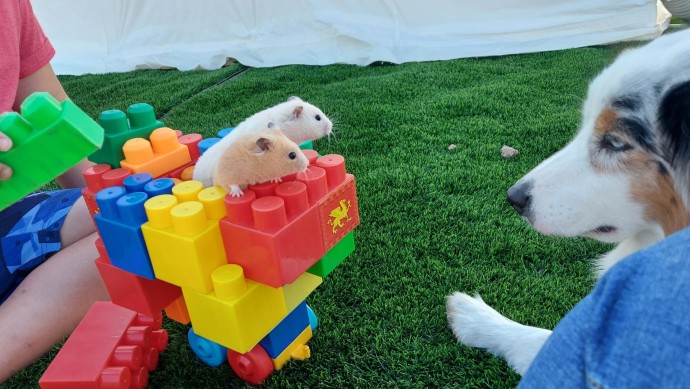Noa Dotan, an animal-assisted therapist, combines CBT (cognitive behavior therapy) with her specialized training and was the first animal-assisted therapist at the Sderot Resilience Center supported by Keren Kayemeth LeIsrael-Jewish National Fund.
In addition to her work at the Resilience Center, Dotan works in communities throughout the entire Eshkol Regional Council. She lives in Sde Nitzan, an agricultural moshav 60 kilometers south of Sderot, which, like Sderot, was evacuated in the wake of the October 7 terror attack on Israel’s south.
On that day, the emergency preparedness squads of Moshav Yesha and Moshav Mivtachim heroically defended their communities and four or five neighboring communities, including Sde Nitzan. Hamas terrorists murdered all of the members of the squads.

Today, Dotan spends much of her time in Eilat, treating displaced children and youth from Sderot and other Gaza Envelope communities. She explains some of the key advantages of animal-based therapy for children. “For some patients, the closed treatment room doesn’t help them. With animal therapy, children become the caregivers. They can control the animals, train the dogs, clean the goat cages, and prepare food for the animals. They are always doing things.”
Dotan adds that during animal therapy, children can sometimes express messages that they have difficulty verbalizing. She cites the case of a child who built a house from Lego pieces for hamsters. Dotan noticed that the boy added wheels to the bottom of the structure. He explained that the house had moved because he himself was not living in his own house. By building the hamster’s home, he described his own circumstances, which led to a further conversation with Dotan about his life. “Our purpose is to enable children to function again and utilize their resilience to function in the new reality of their lives. Animals are a bridge between the therapist and patient.”
While most of the population of Sderot has been evacuated to hotels in Eilat, Jerusalem, and the Dead Sea, Dotan has also occasionally been in Sderot during this period. She recounted the story of a recent visit to the city together with family that she was treating – a mother with her nine-year-old daughter and three-year-old son, whose father was murdered and is buried in Sderot. “They didn’t take the children to the cemetery when he died,” explains Dotan. “We went together to the cemetery to understand what it was to see their father’s grave and to write him letters.” She adds that understanding animals and their life cycle, which can frequently end suddenly, can help children deal with family loss.
After the October 7 massacre, the center’s endeavors have become even more essential. For this reason, KKL-JNF has made supporting the project one of its priorities.
KKL-JNF is expanding its assistance to those affected by the war, and has announced that it has distributed NIS 1 million to bereaved families in the south and north who lost their loved ones during the fighting. The assistance was provided by KKL-JNF in its role as trustees of the Bauman Foundation, in cooperation with and on the recommendation of the Department of Families and Commemoration at the Ministry of Defense.
Chairman of KKL-JNF, Yifat Ovadia-Lusky: "KKL supports the bereaved families and is here for them even in the most difficult times. It is the bedrock of the families, and the bedrock of the entire nation of Israel. KKL-JNF will continue to work for the communities and the residents so that the communities will be preserved and returned to their homes in the north and south. As part of our activities to strengthen the Israeli home front, we help the bereaved families and stand by their side."
While the vast majority of the city’s residents have been evacuated, it is estimated that between 2,000 and 2,500 residents remain in Sderot, including Holocaust survivors, the homeless, those suffering from complex illnesses who fear that they will not be able to receive appropriate treatment at the hotels, and people with psychiatric problems. Speaking for those who have left Sderot, she says, “It’s not easy to be a refugee, even if you are staying in a five-star hotel.”
KKL-JNF has been a supporter of the Sderot Resilience Center and has helped to ensure emergency mental health care for terror victims in Israel’s south. Click here and give generously to KKL-JNF to help the residents of Sderot overcome the trauma of October 7.
For every donation, KKL-JNF will gift a pair of challot to a Sderot resident.
This article was written in cooperation with KKL-JNF.

